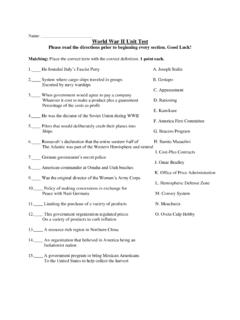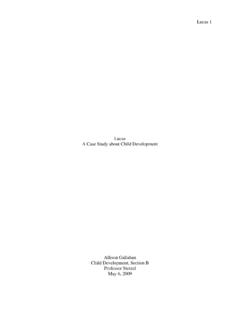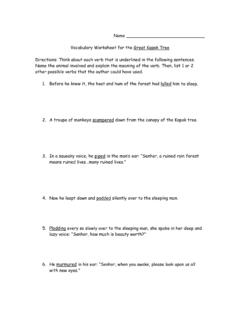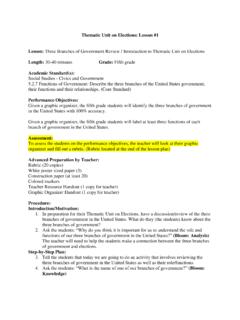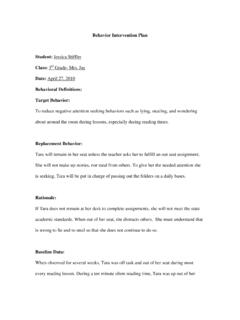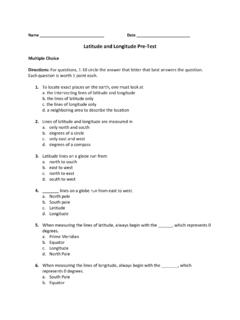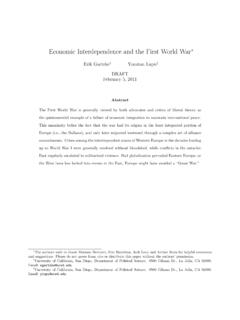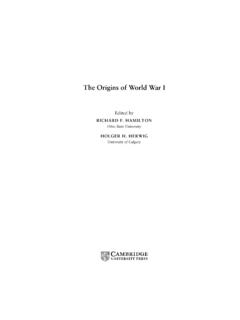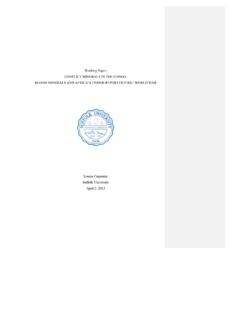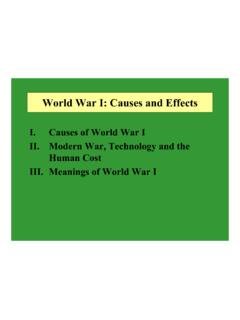Transcription of The Shaping of British Public Opinion during …
1 The Shaping of British Public Opinion during world War I Matthew Morris British History Professor Angelos November 17, 2010 Morris 1 In 1914 Lloyd George had remarked that Europe stumbled and staggered into war (Teed 71). This quote describes how a domino effect had brought all the major European powers into the first Great War. world War I was caused by a buildup of "one thing led to another," or the treaty alliance system that was in place in Europe ( first ). The series of events that took place on the continent of Europe before the start of the war were crucial reasons for why the war itself happened and for why the major powers were a part of it. Although Britain is an island that is isolated from the rest of Europe, these crucial events dragged them into the war. Britain entered the war for two main reasons; one because they were under treaty with both France and Belgium, making them feel it was a moral obligation to defend them from the Central Powers.
2 The second reason Britain entered the war was to justify the principle that small nationalities are not to be crushed by the arbitrary will of strong overmastering power (Arnstein 321). These are the reasons for how Britain justified entering the war making it The first world War. However to the Public and even some highly regarded government officials these reasons were not enough at the start, middle, or end of the war. Any time a nation enters a war it is important to get a strong base of Public support behind the decision so that it is a positive situation throughout the entire nation. It was not until late August at the Public interest grew for this war with a mixture of fear, curiosity and anticipation, spurred on by the realization that this was a struggle for national preservation (Donaldson). The Public had been unaware of the war that was brewing across the continent that it seemed to be caught off guard upon its arrival.
3 This would make it even more challenging to shape a positive Public Opinion for the first world War. When Britain declared for war it was the Public Opinion in which they would need to influence in a positive manner if they were going to be able to supply soldiers to the front lines, raise enough money to fund the war, and operate the factories at home. The ability of the government to provide proper Morris 2 reasoning for the decision to go to war will be important in attracting a positive Public response. Although it only matters how the people of a nation take to that reasoning and choose whether to support the cause or protest the fight. Throughout the first Great War the British Public Opinion fluctuates to both ends of the spectrum, which will force the government to take drastic steps in order to keep the country united during this time of need.
4 When world War I was forced upon Britain it was faced with a decision that would affect their country for years to come. As the domino effect of the alliances Britain had with other European countries began to take place there was indifference amongst the British people on whether or not to go to war. Britain was linked to the defense of France once an invasion from Germany seemed to be inevitable, but this would not be enough reasoning to sway the Public interest of a world war. The general populace was, in most cases, largely unaware of the imminence of war until the end of the month ( first ). Toward the end of July, Europe was on the verge of war and there was still a division of Opinion not only in the Public but in the government as well. Four senior members of the government, Charles Trevelyan, David Lloyd George, John Burns, and John Morley, were opposed to the country becoming involved in a European war and they informed the Prime Minister, Herbert Asquith, that they intended to resign over the issue ( British ).
5 The first world War had not even begun and already there was a split in the government and of a nation. It was up to the Prime Minister to now bring together a united government and country in order for Britain to experience the greatest success. Prime Minister Asquith says he speaks for the country as a whole and we made every effort any government could possible make for peace (Arnstein 321). There was a lot of opposition to Britain entering the war from the beginning, which is why Herbert Asquith felt it was necessary to explain to the people that this is the only option they had. Prime Minister Asquith described what they were Morris 3 fighting for by saying, This war has been forced upon us. What is it we are fighting for? Everyone knows, and no one better than the government, the terrible, incalculable suffering, economic, social, personal and political, which war, and especially war between the Great Powers of the world , must entail (Arnstein 321).
6 Once this statement was released all of the government officials who promised they would resign did except for Lloyd George who was convinced to stay by the Prime Minister. Lloyd George then became a top player in the British government and was the lead man in trying to escalate the war quickly in order to gain a quick victor ( British ). After the declaration of war and the statement issue by Asquith there was some positive reaction from the Public who began gearing in support of the war. It was surprising that there was an excitement spread throughout Britain to the news of war with an overwhelmingly enthusiastic, far more than expected ( first ). The main reason for the high support and strong Public Opinion of the first world War was due to the fact that many believed it would be over by Christmas. By going to war the British would be able to restore order in Europe with Britain atop them all, which was very appealing to the Public because of a hard life they had been experiencing up to this point in 1914.
7 This world War gave hope to the people in Britain of becoming the overwhelming power in Europe once the war concluded which helped spread an excitement amongst the people and created a positive Public Opinion . The frontlines of war and Public Opinion back home in Britain can be closely related because of the stalemate world War I became. At the frontlines the troops who were excited to go to war and serve their country were quickly turned away from that notion because of trench warfare. Back at home in Britain we also see the general Public and government change their attitude of the war when they realize it is not going to be a quick one by any means. It is said that the trenches symbolized the war (Clarke). The devastation felt in the trenches by the soldiers Morris 4 were expressed in poems and letters that were read by the general Public .
8 Upon reading these writings the Public Opinion would shift to a negative outlook on the war because of the horror the young men of Britain were facing on a daily basis. Laurence Binyon a soldier serving for Britain wrote a poem called For the Fallen that described life for the soldiers in the trenches. The poem read, They shall not grow old, as we that are left grow old: Age shall not weary them, nor the years condemn (Clarke). It was poems such as these that created a negative image of war for the Public and caused them to rethink supporting such a devastating event. Along with many other publications by soldiers and media on the horrors of the War helped negatively change Public Opinion in Britain. With an increasing negative Opinion of the British people the government was forced to take action in order to keep the war efforts strong.
9 It is David Lloyd George who was a big reason for keeping some support from the Public throughout the War. Through the use of war propaganda and media usage he was very successful at keeping the army at a manageable number and keeping supplies at the frontlines. It is the Public back home who is responsible for these successes because the people of Britain are the ones who must enlist and those who remain home have to stay motivated to work in the factories. One of his greatest accomplishments was his ability to persuade Scott who was the editor of the Manchester Guardian to write in support of the war effort ( British ). There were two reasons for this being a significant achievement: it helped keep the people of Britain s Public Opinion in support of the war and it shifted Scott who was known to be an anti-war leader ( British ). These were the type of events that shaped the course of the war for Britain because if this had not happened it could have very well led to a Public Opinion that spiraled out of control toward the negative aspect of things.
10 However propaganda was an important but minor contribution to the Public Opinion because it Morris 5 would take much more from the government during the war if they were to keep the nation united. Since the Britain Public Opinion of world War I was constantly shifting the government had to take another step in ensuring they did not lose the interest of winning this devastating war. The use of war propaganda was an essential tool in doing so because it not only helped in the recruitment of more soldiers as the war dragged on, but kept the idea of a unified nation instilled in its people. It was the British government that took the approach of projecting into the future with propaganda campaigns. A specific propaganda ad is shown asking women: When the War is over and someone asks your husband or son what he did in the great War, is he to hang his head because you would not let him go?
